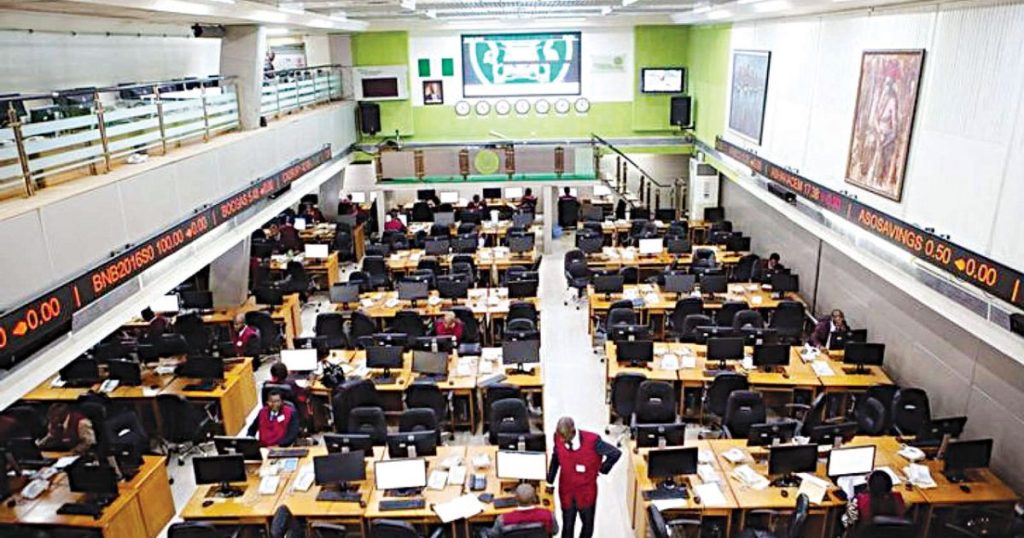The Nigerian stock market commenced April on a downturn, reversing the previous week’s gains and extending the negative trend from March. Over the three trading days, the NGX All-Share Index retreated by 0.14%, settling at 105,511.89 points. This decline translated to a 0.17% drop in market capitalization, reaching N66.15 trillion and inflicting a loss of approximately N110 billion on investors. Ironically, this bearish performance occurred despite the publication of strong 2024 audited financial results and substantial dividend announcements, particularly from the banking sector. Compounding the market’s woes was the delisting of three companies – Capital Oil Plc, Goldlink Insurance Plc, and Medview Airlines Plc – due to their failure to comply with listing requirements.
The delisting of these three companies highlights the regulatory efforts to maintain the integrity of the Nigerian stock exchange. These delistings serve as a warning to other listed companies about the importance of adhering to the listing requirements and maintaining financial stability. The removal of companies that fail to meet these standards protects investors and ensures the overall health of the market. The NGX Regulation, demonstrating proactive oversight, also placed EkoCorp Plc on notice for non-compliance. Despite initial engagements and a stay of execution on the delisting process, EkoCorp’s continued inability to rectify its deficiencies prompted the NGX RegCo to publish a notice in national newspapers, granting the company a final four-month grace period. Failure to comply within this timeframe will result in EkoCorp’s delisting.
Trading activity during the week under review was notably subdued, with a total turnover of 1.183 billion shares worth N28.87 billion, exchanged across 42,397 deals. This represents a significant decrease from the previous week’s robust activity, which saw 7.521 billion shares worth N398.95 billion traded in 61,312 deals. The financial services sector dominated trading activity, accounting for 76.60% of the total volume and 65.56% of the total value. Consumer goods and services followed, albeit with considerably lower contributions. Fidelity Bank Plc, Zenith Bank Plc, and Universal Insurance Plc emerged as the most actively traded stocks, collectively accounting for a substantial portion of the overall trading volume and value.
Market breadth, a key indicator of investor sentiment, painted a bleak picture with 23 equities appreciating, 51 depreciating, and 73 remaining unchanged. This weak market breadth underscores the prevailing bearish sentiment despite positive news from some sectors. Sectoral performance largely mirrored the overall market trend, with notable exceptions. While the NGX Banking Index managed to buck the trend with a week-on-week increase spurred by positive sentiment in several banking stocks, including Guarantee Trust Holding Company, Fidelity Bank, AccessCorp, and Wema Bank, other sectors faced declines.
The NGX Insurance Index led the sectoral losses, followed by Oil & Gas, Consumer Goods, and Industrial Goods. These declines were driven by sell-offs in key stocks such as SUNU Assurance, Universal Insurance, Oando, Tantaliser, PZ Cussons, Lafarge Africa, and Cutix. The NGX Commodity Index remained unchanged for the week. This divergence in sectoral performance highlights the complex interplay of factors influencing the Nigerian stock market. While the banking sector benefited from positive sentiment, other sectors succumbed to selling pressure, contributing to the overall bearish trend.
Despite the prevailing negative sentiment, some stocks registered significant gains. VFD Group topped the gainers’ chart with a 20.8% increase, followed by Union Dicon (+19.60%), Africa Prudential (+15.7%), NGX Group (+11.9%), and UPDC REIT (+10.9%). Conversely, UAC Nigeria N suffered the steepest decline, plummeting by 18.3%. Other significant losers included SUNU Assurance (-13.4%), Universal Insurance (-13.3%), Oando (-13.1%), and Consolidated Hallmark Holdings Plc (-12.8%). The mixed performance of individual stocks, even within declining sectors, suggests that investors are selectively targeting companies perceived as having strong fundamentals or growth potential, despite the overall market downturn. This selective investment approach underscores the importance of thorough company analysis and a long-term investment strategy in navigating volatile market conditions.














